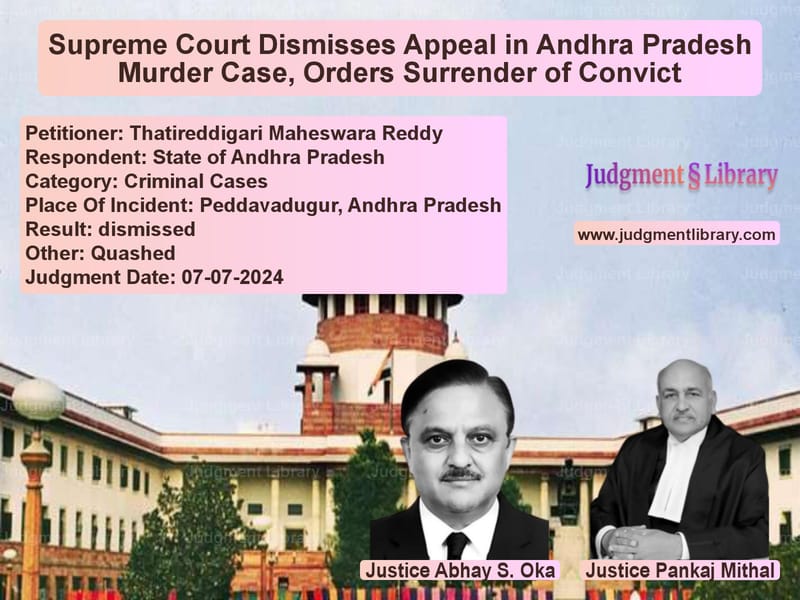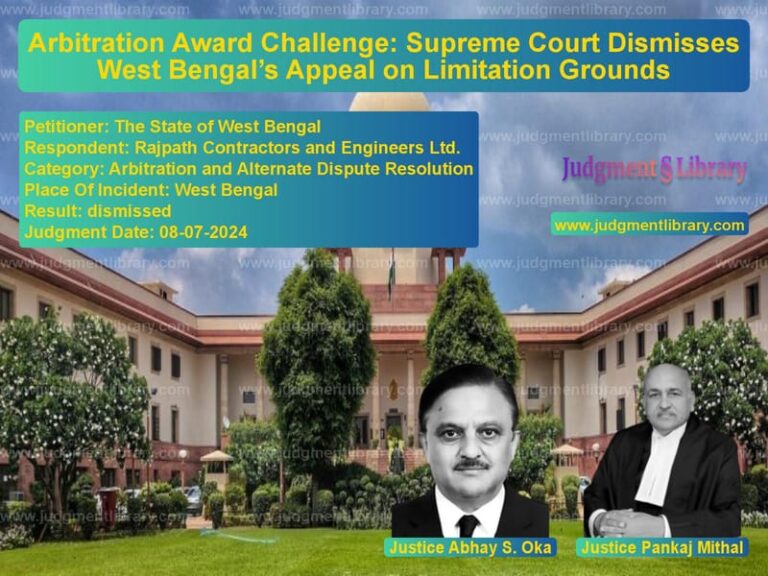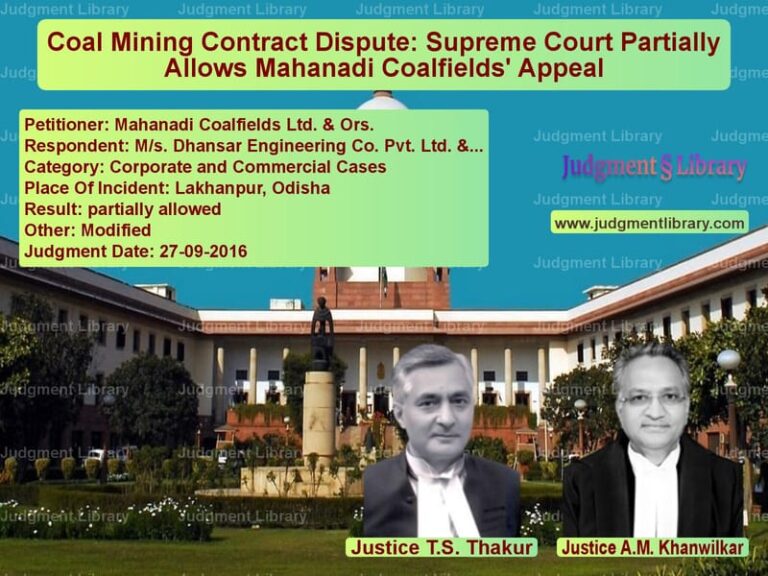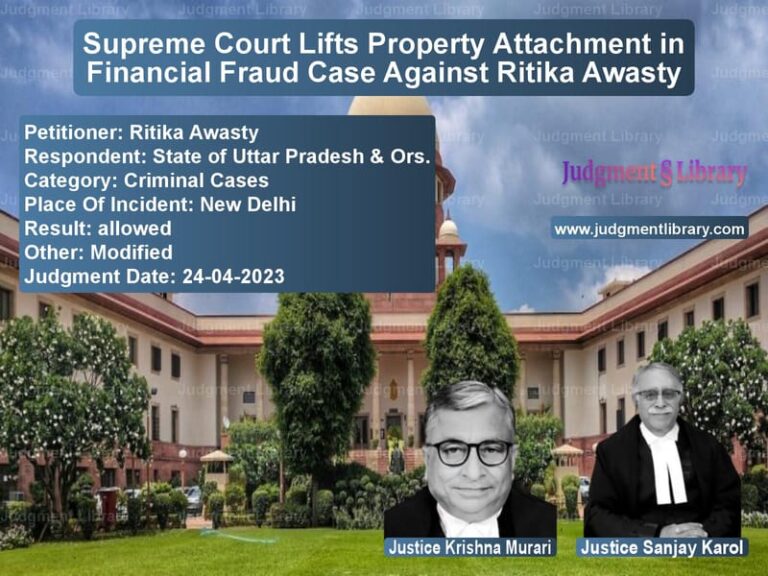Supreme Court Dismisses Appeal in Andhra Pradesh Murder Case, Orders Surrender of Convict
The Supreme Court of India, in its judgment dated July 8, 2024, dismissed the appeal of Thatireddigari Maheswara Reddy, who was convicted under Sections 148 and 302 of the Indian Penal Code (IPC) for the murder of Shiva Prasad Reddy. The Court upheld the trial court’s findings, ruling that the prosecution had established the accused’s involvement beyond a reasonable doubt.
Background of the Case
Thatireddigari Maheswara Reddy was one of eleven accused charged with the murder of Shiva Prasad Reddy in Peddavadugur village, Andhra Pradesh, on July 26, 1997. The victim, a practicing lawyer and political leader, was allegedly hacked to death with hunting sickles by a group of men. The prosecution claimed that the murder was politically motivated, stemming from a dispute related to the village’s Water Users Association elections.
The case was based on eyewitness testimonies, forensic evidence, and the recovery of weapons from the accused. The trial court convicted six accused, including Maheswara Reddy, under Sections 148 and 302 IPC, while acquitting three others. The Andhra Pradesh High Court later upheld these convictions.
Arguments by the Appellant
The defense, represented by counsel for the appellant, argued that:
- The eyewitnesses, PW-1, PW-2, and PW-3, were related to the deceased and, therefore, biased.
- These witnesses were chance witnesses who happened to be near the crime scene and could not be relied upon.
- The prosecution failed to establish a clear motive for the murder.
- Key witnesses PW-4 to PW-6 did not support the prosecution’s case.
Arguments by the Respondent (State of Andhra Pradesh)
The prosecution, represented by counsel for the State, argued that:
- The accused had a political rivalry with the deceased, which provided a clear motive.
- The prosecution’s eyewitnesses had consistently identified the accused and ascribed specific roles to each.
- Weapons recovered from the accused had traces of human blood, further corroborating the case.
- The medical evidence confirmed that the injuries were inflicted using hunting sickles, as described by the witnesses.
Supreme Court’s Observations
1. Reliability of Eyewitness Testimony
The Supreme Court rejected the argument that the prosecution’s witnesses were unreliable due to their relationship with the deceased. It held:
“Only because an eyewitness is a member of the deceased’s family, per se, the evidence of such a witness cannot be discarded. If the evidence of an eyewitness who is a close relative of the deceased is cogent, reliable, and credible, it can always be relied upon.”
2. Role of the Accused
The Court noted that all three key witnesses—PW-1, PW-2, and PW-3—gave consistent accounts of the attack and ascribed specific roles to each accused. The testimony of PW-2, an independent witness, further strengthened the prosecution’s case.
3. Medical and Forensic Evidence
The Court found that the medical evidence was consistent with the eyewitness accounts. The post-mortem report listed 16 injuries on the deceased, all inflicted with sharp weapons. The forensic report confirmed that the seized weapons contained traces of human blood.
4. No Delay in Lodging Complaint
The Court also noted that the First Information Report (FIR) was lodged promptly, and there was no unexplained delay in reporting the crime.
Final Judgment
- The Supreme Court dismissed the appeal and upheld the conviction.
- The appellant was granted one month to surrender.
- The Andhra Pradesh government was directed to consider permanent remission for the appellant, similar to the co-accused who had already been granted remission.
- The State was instructed to make a decision within two months of the appellant’s surrender.
Key Takeaways
- Eyewitness Testimony Can Be Crucial: The Court reaffirmed that testimony from family members of the deceased can be relied upon if found credible.
- Forensic Evidence Strengthens Prosecution Cases: The presence of human blood on the accused’s weapons played a crucial role in confirming their involvement.
- Political Rivalries Can Lead to Criminal Acts: The judgment acknowledged the role of political conflicts in violent crimes.
- Judicial Consistency: The Supreme Court’s ruling aligns with prior cases where convictions were upheld based on strong eyewitness and forensic evidence.
Conclusion
The Supreme Court’s judgment reinforces the principle that convictions in murder cases should be based on credible eyewitness accounts, forensic evidence, and motive. The ruling ensures that politically motivated crimes do not go unpunished while upholding due process.
Petitioner Name: Thatireddigari Maheswara Reddy.Respondent Name: State of Andhra Pradesh.Judgment By: Justice Abhay S. Oka, Justice Pankaj Mithal.Place Of Incident: Peddavadugur, Andhra Pradesh.Judgment Date: 07-07-2024.
Don’t miss out on the full details! Download the complete judgment in PDF format below and gain valuable insights instantly!
Download Judgment: thatireddigari-mahes-vs-state-of-andhra-prad-supreme-court-of-india-judgment-dated-07-07-2024.pdf
Directly Download Judgment: Directly download this Judgment
See all petitions in Murder Cases
See all petitions in Bail and Anticipatory Bail
See all petitions in Judgment by Abhay S. Oka
See all petitions in Judgment by Pankaj Mithal
See all petitions in dismissed
See all petitions in Quashed
See all petitions in supreme court of India judgments July 2024
See all petitions in 2024 judgments
See all posts in Criminal Cases Category
See all allowed petitions in Criminal Cases Category
See all Dismissed petitions in Criminal Cases Category
See all partially allowed petitions in Criminal Cases Category







